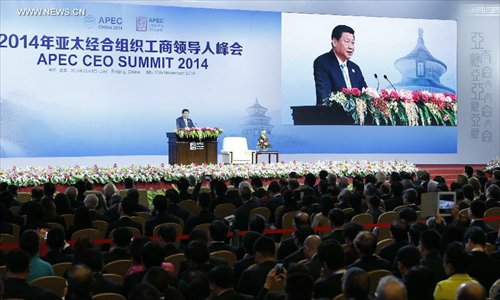 Close-up view of August Aerobatic Team
Close-up view of August Aerobatic Team
 Goddesses married in 2014
Goddesses married in 2014
 Polar region photos raise worldwide awareness of global warming
Polar region photos raise worldwide awareness of global warming
 Get off at the last stop — Beijing Subway in vision
Get off at the last stop — Beijing Subway in vision
 Top 100 beauties in the world!
Top 100 beauties in the world!
 Gallery: Who is the most beautiful one?
Gallery: Who is the most beautiful one?
 If you like autumn, put your hands in the air!
If you like autumn, put your hands in the air!
 Fan Bingbing's "Queen style" in new play
Fan Bingbing's "Queen style" in new play
 Lingerie show at 2014 Miss China
Lingerie show at 2014 Miss China
 J-10 fighters show aerobatic stunts in smog-free sky
J-10 fighters show aerobatic stunts in smog-free sky
 |
| Chinese President Xi Jinping delivers a keynote speech at the opening ceremony of the 2014 Asia-Pacific Economic Cooperation (APEC) CEO Summit in China National Convention Center of Beijing, capital of China, Nov. 9, 2014. (Photo/ Xinhua) |
November was a special month for the Chinese economy, the Asia-Pacific economy and the world economy, when the leaders of the Asia-Pacific region gathered in Beijing. Substantial progress was made during the APEC meeting: “Asia-Pacific Free Trade Area” sparked zealous discussion; An APEC Connectivity Blueprint was created to enhance physical, institutional, and people to people connections in the Asia-Pacific region; The Beijing Declaration on Fighting Corruption was passed. Half of the 100 proposals were put forward by China.
The 2014 G20 summit was held in Brisbane, the capital city of Queensland, Australia, where China proposed to work together with others to press ahead with economic reform. Other members of G20 were more than willing to agree with China’s proposal.
It is natural that the world has shifted its focus to China, as China’s development path is increasingly recognized by other counties. The Shanghai and Hong Kong Stock Connect has been launched, allowing Hong Kong and Shanghai investors to buy and sell on each other’s stock markets. This is key to China’s financial reform, and will provide a solid foundation for the internationalization of the RMB and the opening-up of China's capital market.
Moreover, in November, the 10th China International Aviation and Aerospace Exhibition was held in Zhuhai, south China's Guangdong Province. Some 700 exhibitors from home and abroad brought 130-plus planes to the air show, which drew worldwide attention.
China is also actively participating in the defining of new global governance mechanisms and international rules. In November, China pledged to provide 40 billion U.S. dollars to support its proposals for the Silk Road fund, saying that China plans to expand economic ties through partnerships, win-win projects and mutual beneficiaries
China is also gradually opening its market. The China (Shanghai) FTA, which mainly concerned its tertiary industry, including finance, shipping, trade and commerce is mulling new plan to speed up its opening-up.
Prior to October this year China had invested a total of 503 billion yuan in 154 countries. China is trying to seek a balance between drawing in foreign investment and taking its own funds abroad. In so doing, China is playing a more important role in Asia-Pacific region.
Although China is the zone's biggest trade partner and the world's second largest economy, it is still afflicted with bottlenecks in policy, market and so on. Meanwhile, the world is still unsettled, which is thwarting China’s economic development. Therefore, we should keep a clear understanding of the current situation and speed up economic reform so that China can gain more say and influence in the world.
This article was edited and translated from 《世界经济迎来北京时间》, source: People's Daily, Author: Du Haitao
(For the latest China news, please follow @PDChina on Twitter at http://www.twitter.com/PDChina and @PeoplesDaily on Facebook at http://www.facebook.com/PeoplesDaily)
 HK majority will decide fate of protests
HK majority will decide fate of protests Guangdong officials rob graves to meet monthly cremation targets
Guangdong officials rob graves to meet monthly cremation targets A home for all seasons
A home for all seasons GT Leader Round Table discusses reform and growth
GT Leader Round Table discusses reform and growthDay|Week|Month